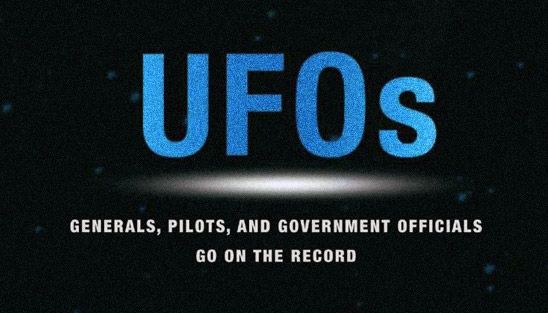by Daniel W. Drezner May 28, 2019 (washingtonpost.com)
• UFOs have historically been associated with crackpot ideas like Big Foot or conspiracy theories involving crop circles, and consistently dismissed. But as more military pilots come forward to describe encounters with unidentified flying objects, government officials reluctantly acknowledge that UFOs (or “UAP”s) do exist. At this point, authorities are trying to destigmatize the reporting of UFOs while adamantly refusing to say that these UFOs are extraterrestrial in origin.
• Alexander Wendt and Raymond Duvall authored a paper entitled: “Sovereignty and the UFO”, published in the journal Political Theory, which argues that state sovereignty is “constituted and organized by reference to human beings alone.” They argue that the real reason UFOs have been dismissed is because it challenges the worldview in which human beings are the most technologically advanced life-forms. “UFOs have never been systematically investigated by science or the state, because it is assumed to be known that none are extraterrestrial. Yet in fact this is not known, which makes the UFO taboo puzzling given the ET possibility.” So if humankind is the most technologically advanced life form, then in order to preserve this premise, UFOs cannot be of an extraterrestrial origin. The UFO can be “known” only by not asking what it is.”
• Wendt and Duvall’s paper makes a persuasive case that UFOs certainly exist, even if they are not necessarily ETs. For them, the key is that no official authority takes seriously the idea that UFOs can be extraterrestrials. As they note, “considerable work goes into ignoring UFOs, constituting them as objects only of ridicule and scorn.”
• In recent years, however, there has been a subtle shift that poses some interesting questions for Wendt and Duvall’s argument. Discussion of actual UFOs has become the topic of serious mainstream media coverage. The government acknowledged the existence of a Pentagon program to study UFOs. A noted astrophysicist claimed that the ‘asteroid’ Oumuamua could be of artificial construction relying on a solar sail. Military pilots came forward in December 2017 and then again in May 2019 relating their encounters with UFOs on both the West and East Coasts of the US. No one in the Defense Department is saying that the objects are extraterrestrial, though even skeptics cannot completely rule out the possibility that extraterrestrial activity is involved.
• So the government and mainstream media are not behaving as Wendt and Duvall would predict. Politico’s Bryan Bender reported that, “The U.S. Navy is drafting new guidelines for pilots and other personnel to report encounters with ‘unidentified aircraft,’ a significant new step in creating a formal process to collect and analyze the unexplained sightings — and destigmatize them.” Deanna Paul of the Washington Post wrote, “Luis Elizondo, a former senior intelligence officer, told The Post that the new Navy guidelines formalized the reporting process, facilitating data-driven analysis while removing the stigma from talking about UFOs, calling it ‘the single greatest decision the Navy has made in decades.”
• As the stigma against the existence of UFOs wears off, will Earth governments face the possibility of the existence of extraterrestrial civilizations as the origin of these unexplained UFOs?
The term “UFO” automatically triggers derision in most quarters of polite society. One of Christopher Buckley’s better satires, “Little Green Men,” is premised on a George F. Will-type pundit thinking that he has been abducted by aliens, with amusing results. UFOs have historically been associated with crackpot ideas like Big Foot or conspiracy theories involving crop circles.
The obvious reason for this is that the term “UFO” is usually assumed to be a synonym for “extraterrestrial life.” If you think about it, this is odd. UFO literally stands for “unidentified flying object.” A UFO is not necessarily an alien from another planet. It is simply a flying object that cannot be explained away through conventional means. Because UFOs are usually brought up only to crack jokes, however, they have been dismissed for decades.
One of the gutsiest working paper presentations I have witnessed was Alexander Wendt and Raymond Duvall presenting a draft version of “Sovereignty and the UFO.” In that paper, eventually published in the journal Political Theory, Wendt and Duvall argued that state sovereignty as we understand it is anthropocentric, or “constituted and organized by reference to human beings alone.” They argued that the real reason UFOs have been dismissed is because of the existential challenge that they pose for a worldview in which human beings are the most technologically advanced life-forms: “UFOs have never been systematically investigated by science or the state, because it is assumed to be known that none are extraterrestrial. Yet in fact this is not known, which makes the UFO taboo puzzling given the ET possibility…. The puzzle is explained by the functional imperatives of anthropocentric sovereignty, which cannot decide a UFO exception to anthropocentrism while preserving the ability to make such a decision. The UFO can be “known” only by not asking what it is.”
When Wendt and Duvall made this argument, there were a lot of titters in the audience. I chuckled, too. Nonetheless, their paper makes a persuasive case that UFOs certainly exist, even if they are not necessarily ETs. For them, the key is that no official authority takes seriously the idea that UFOs can be extraterrestrials. As they note, “considerable work goes into ignoring UFOs, constituting them as objects only of ridicule and scorn.”
READ ENTIRE ARTICLE
FAIR USE NOTICE: This page contains copyrighted material the use of which has not been specifically authorized by the copyright owner. ExoNews.org distributes this material for the purpose of news reporting, educational research, comment and criticism, constituting Fair Use under 17 U.S.C § 107. Please contact the Editor at ExoNews with any copyright issue.

